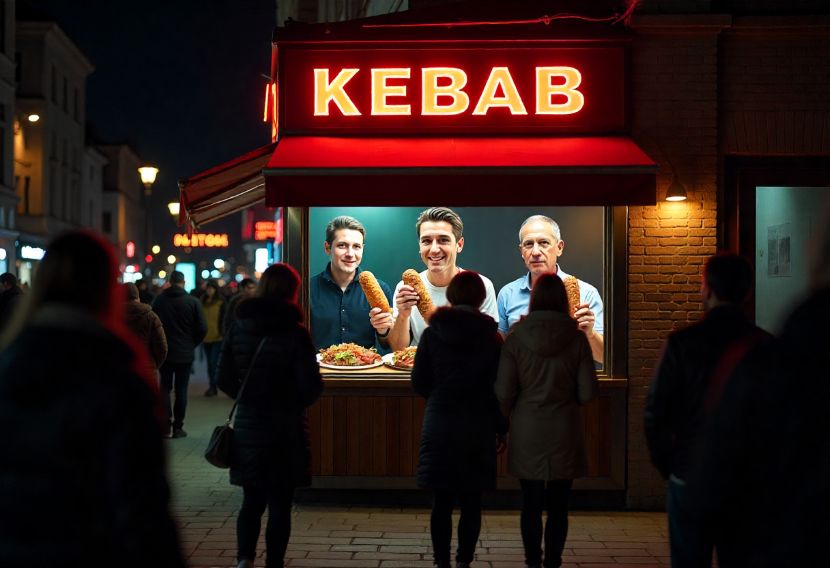Wednesday, July 23, 2025

On vacations abroad, particularly in pulsating cities as Istanbul is, tourists rely on visual cues to decide about their dining options. But one family of unsuspecting tourists were recently given a quite different story when they visited the Turkish city of Istanbul, after being pranked by an advanced AI at a local kebab shop. When looking for a place to eat, they came across a garish digital advertising signboard with hyper realistic pictures of people like David Beckham, Dwayne Johnson, Mark Zuckerberg and rap artist Snoop Dogg cheerfully promoting the modest eating joint.
At first excited at the prospect of eating in a place that they had heard international stars had patronized, the prospect became suspicious. On close examination, the visitors discovered a tiny disclaimer tag, “Imagined by AI,” that disclosed these endorsements as being digitally invented and completely fictional.
What this incident suggests is a growing risk for a common concern that affects tourists around the world: advanced AI solutions can now develop falsified and highly believable images, endorsements, and the like and can sway travelers’ decision-making processes in the worst ways. When scams are well executed like this, they mislead victims into thinking they are reputable businesses, thereby harming victims’ trust in legitimate businesses and negatively impacting a legitimate business’ reputation.
The Expanding Impact of AI-Generated Scams on Travel
AI-generated deception isn’t limited to celebrity endorsements. Travelers worldwide report increasing encounters with sophisticated scams powered by artificial intelligence. Government tourism advisory boards in Australia, the UK, and the USA now actively warn travelers about AI-crafted online scams targeting vacationers. Common tactics include fake hotel booking websites, misleading travel deals offered by automated chatbots, and artificially-generated hotel or restaurant reviews.
One alarming case from Vietnam involved tourists arriving at a supposed eco-friendly lodge advertised online, only to find a basic shed, not the lush accommodations digitally depicted. In Bali, Australian travelers flagged villa advertisements featuring surreal architecture and bizarre visual inaccuracies—clear indicators of AI manipulation.
For the travel industry, particularly business travelers, the growing prevalence of AI scams poses substantial risks. Businesses that depend on travel agencies and online reviews could inadvertently rely on deceptive information, causing disruptions, financial losses, and safety concerns.
Official Travel Safety Advice from Government Sources
Authorities, including the U.S. State Department and Australia’s Smartraveller program, strongly recommend travelers take additional precautions to avoid AI scams:
- Always verify travel deals and bookings directly through official hotel and airline websites rather than relying solely on third-party sources or promotional emails.
- Cross-reference reviews across multiple reputable platforms to confirm authenticity. Independent review forums and trusted social media sources are recommended.
- Avoid engaging with suspicious chatbots offering overly attractive deals; these are often designed solely to obtain sensitive financial information.
- Never provide personal or financial details via unsolicited emails or messages.
Quick Tips for Travelers and Business Professionals
To navigate the complex digital landscape safely, travelers—especially business professionals—should:
- Inspect images closely for anomalies or unnatural features, like distorted fingers, irregular backgrounds, or odd reflections.
- Confirm accommodations directly by contacting the property to verify all amenities and ensure images match real offerings.
- Report suspicious activity to local tourism boards or authorities promptly to assist others in avoiding similar scams.
Additional Information for Istanbul Tourists
For travelers planning to explore Istanbul, it’s important to note that authentic restaurants and popular eateries rarely rely solely on celebrity endorsements. Instead, genuine local hotspots often have numerous credible reviews across platforms like Tripadvisor, Google Maps, or even recommendations from locals.
Tourists should consider checking with the official tourism websites of Istanbul and Turkey’s Ministry of Culture and Tourism to access verified lists of reputable businesses and attractions. Travelers can also visit visitor centers to receive trustworthy information and prevent falling victim to misleading advertisements.
Future Implications and Staying Vigilant
And as AI keeps gaining ground, the number and sophistication of digital deceptions aimed at tourists and business travelers is likely to rise. It is important for leisure and business travellers to stay aware and to stay safe, and increasingly that means improving digital reading to spot and avoid those threats.
For travel and tourism businesses, those that educate their employees about digital scams will be well placed to continue work productively and in a secure manner. Hotels and restaurants need to play an active role in having transparent online teaching, positive reputation based on verified customer reviews and real interactions, thus building trust and minimizing the negative impact on the trust caused by the AI-driven fraud.
At the end of the day, however, surviving in a digital world comes down to being sceptical when you see something too good to be true, too visually-impressive to seem real, or just something you never thought you’d find offered for “free.” A fight over an Istanbul kebab shop is a timely reminder that in the age of artificial intelligence, travelers need to not only read the fine print, but also look closely at each pixel.
Tags: AI deepfake, AI scams, AI-generated images, business travel impact, business traveler tips, celebrity endorsements, digital safety, fake reviews, Istanbul, kebab shop, tourism advice, tourist scams, Travel advisory, travel alerts, travel fraud, travel safety tips, travel scams, Travel Security, Turkey







